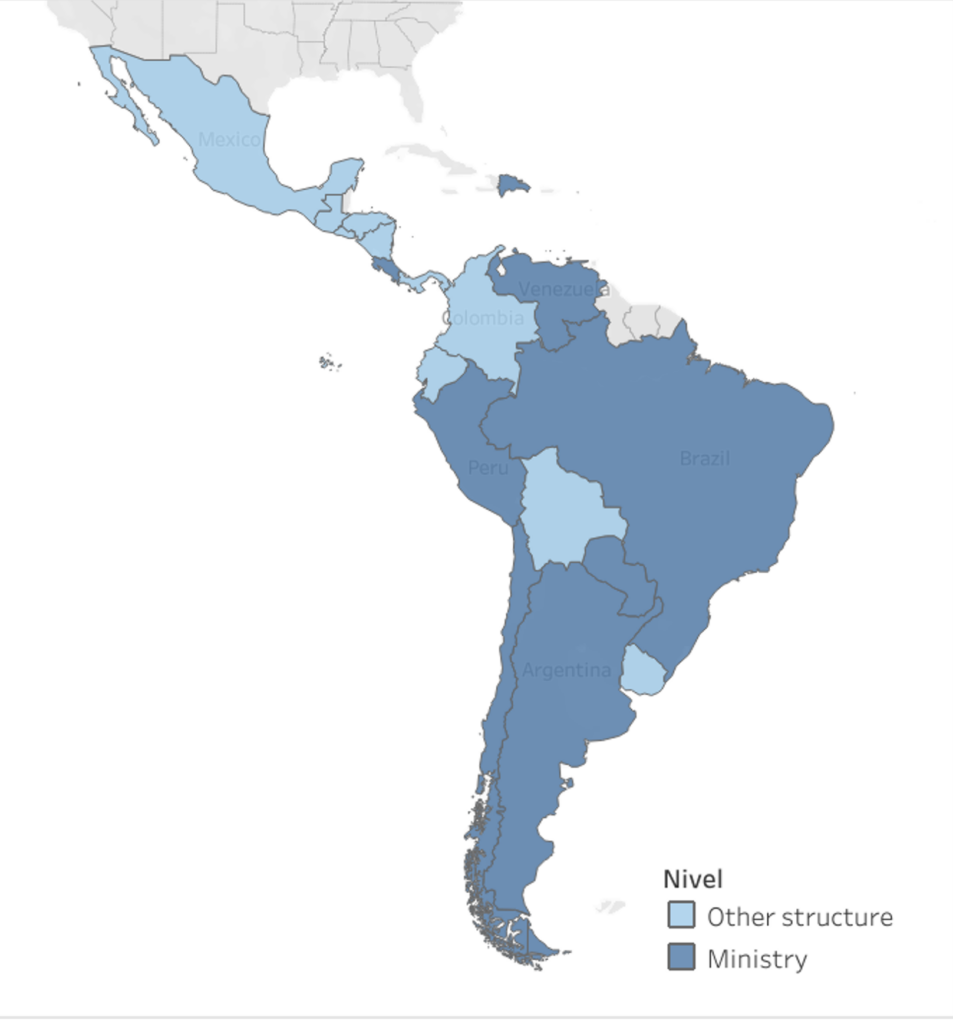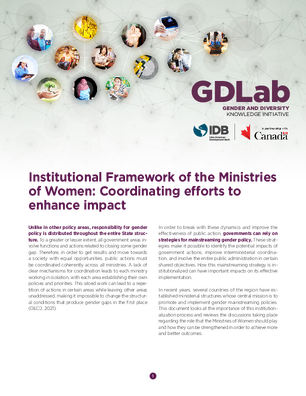Almost half of Latin America and the Caribbean countries have a Ministry for Women. But do we need them? The short answer is yes. But the reality is more complex. While the mission of these ministries is essential for the countries’ development, they often face significant obstacles in fulfilling their functions.
In a new GDLab policy brief, the IDB’s Gender and Diversity Knowledge Initiative takes a snapshot of these regional agencies. The brief addresses where they stand now, why they are essential, and how to make them better serve their purpose.
Women’s Ministries: real drivers of social change
The Ministries of Women have the promotion and implementation of cross-cutting gender policies as their primary mission. These governmental structures have two focuses of action:
- Coordinate actions within the government
- Promote cultural change in coordination with civil society.
The Ministries of Women have a fundamental role in capacity building within the government, in the creation of networks with non-governmental actors, and in the generation of evidence on the state of gender gaps and the effectiveness of implemented programs.
X-ray of our region
44% of the countries in the region have a Ministry for Women, while in the remaining countries, there are other lower-ranking institutional structures, according to 2021 data. A longitudinal analysis of these regional offices shows that, between 1990 and 2016, the vast majority of countries maintained or increased the office hierarchy dedicated to this issue.
Map of ministries in the region, as of 2021


Even with these advances, in general, the region’s ministries have weak structures that put the performance of their functions at risk. Budget data for 2022 for four countries in LAC indicate that the Ministries of Women represent only 0.18%of the total national executive branch budget. In addition to having a limited budget, these ministries are often understaffed.
Four actions to strengthen a Ministry of Women
The GDLab brief identifies four actions based on empirical evidence that, if implemented jointly, support the strengthening of the capacities of these offices. These actions are essential for ministries to be catalysts for social change, coordinating government actions horizontally and vertically to promote the closing of gender gaps.
- Have an excellent mainstreaming strategy design. Countries with the longest track record in developing institutions that work to achieve gender equality tend to have strong strategic plans. These guide mainstreaming actions and prioritized policies to achieve measurable goals. The plans contain details on work logic, action plans, priorities, timelines, objectives, and expected results or goals that give a clear and measurable structure to the mainstreaming process.
- Ensuring political empowerment. Political empowerment from the center of the Government (Presidency) is critical for the gender area to influence the actions to be carried out in other sectors. It is also necessary to monitor the progress of compliance with the commitments assumed and to unblock possible implementation problems or conflicts of interest between the areas that have a role in the compliance chain.
- Align governance processes. Mainstreaming strategies turn out to be effective if they are integrated into the routines and accountability mechanisms that already exist within the government. This coordination must be reflected in planning and budgeting instances. For example, gender budgeting (GB) is a tool for achieving the integration of gender mainstreaming in the actions of the entire government.
GBs disaggregate public budgets by establishing their differential gender impacts and ensuring that government commitments to gender equality are translated into budgetary commitments. Since the end of the 1990s, different GB experiences have been identified in the region. Argentina and Mexico stand out for their efforts to incorporate and institutionalize gender budgeting. - Improve the available information. Having integrated information systems contributes to building a multisectoral view of the needs of women and their families. This information is key to improving the definition of policies with a gender perspective and the design of specific programs.
A key piece for development
If we continue with these four actions, the Ministries of Women in the region have the potential to become significant players to reach equity. At the IDB, we believe that promoting and supporting the strengthening of these institutions is necessary to encourage the development of Latin America and the Caribbean.



Leave a Reply